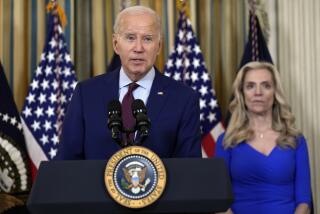Defund Quayle’s Autocratic Competitiveness Council : Regulatory agencies: His secretive group blocks health, safety and environmental policies at the behest of business.
- Share via
For the past two years, taxpayers have financed the shadowy activities of Vice President Dan Quayle’s Council on Competitiveness. In this time, the council has steadily built its reputation by working behind the scenes to undermine health, safety and environmental regulations. This week, the House Appropriations Committee will consider a measure to strip the council of its funds and bring accountability back into the regulatory process. It could mark the beginning of a major battle between Congress and the President over the shape of federal regulation.
From the Clean Air Act to nutrition labeling, the Quayle Council on Competitiveness has covertly intervened in the normally open regulatory process on behalf of big-business interests. “Now is your chance. Come and tell us what regulations and what rules are burdening the business sector,” Quayle told business leaders recently. Meanwhile, the council has consistently refused to disclose even the most basic information about who it meets with and what its agenda is. What’s more, Quayle and his staff have repeatedly declined to answer Freedom of Information Act requests from the public. The council is equally contemptuous of Congress; neither Quayle nor his staff will testify before committees with oversight over the agencies whose regulations they meddle with. More than once, members of Congress have been forced to subpoena even basic documents.
By acting as a superagency, with the power to review all regulations, the Quayle council not only adds another layer to an already lengthy process, it defies the basic principles upon which the regulatory edifice is built. When a federal agency writes rules, it is required by law to hear from all sides, make decisions only on the merits and make communications available at a public docket where anybody can look at them. The Quayle council does not follow any of these open-government standards.
The most recent example of the council’s backdoor maneuvering surfaced at the Earth Summit in Rio, where Competitiveness Council staff succeeded in averting U.S. support for the biodiversity treaty supported by other participating nations. Lobbied heavily by biotechnology groups, such as the Industrial Biotechnology Assn. and Genentech, council staff were highly critical of the treaty. Meanwhile, press accounts reported that John Cohrssen, a council staffer, leaked the draft agreement in order to raise the ire of biotechnology companies and sink the treaty.
With such examples of dirty dealings, how is it that the Quayle Council on Competitiveness continues to exist? The answer: creative budgeting. The vice president’s office simply shuffles funds around to pay for the council’s operations. After all, Congress never authorized the Council on Competitiveness; no funds have ever been specifically appropriated to pay for it. In fact, the formation of the council was quietly announced by President Bush in a cursory June, 1990, memo sent only to agency heads.
Now Congress has the chance to cut off funding of this shady entity. An amendment is before Congress that would forbid the use of any of the vice president’s funds to pay for the Competitiveness Council. The amendment has the support of a broad coalition of consumer, environmental and labor groups. Intriguingly, this coalition is now being joined by businesses opposed to the way Quayle doles out “regulatory favors.” Two weeks ago a new group, Businesses for Social Responsibility, was announced to advance a socially responsible agenda. Among the group’s 55 members are such success stories as Reebok, the Body Shop and Stride Rite. The first item on the agenda: undoing the Quayle Council on Competitiveness.
The defunding amendment comes up for hearing Thursday by the House Appropriations Committee, where Rep. Ed Roybal (D-Los Angeles), chairman of the Treasury subcommittee, has a key vote. A “yes” vote on the legislation would send a message to the Administration that it’s time to end the council’s abuse of power. Indeed, after so many of the Quayle council’s misdeeds have been exposed, Congress would be committing its own breach of responsibility if it allows the funding to continue.
It’s time to shut the Competitiveness Council’s back door and restore accountability to the regulatory process. The taxpayers--who not only pay regulators’ salaries but are affected profoundly by the regulations that they write--deserve nothing less.
More to Read
Get the L.A. Times Politics newsletter
Deeply reported insights into legislation, politics and policy from Sacramento, Washington and beyond. In your inbox twice per week.
You may occasionally receive promotional content from the Los Angeles Times.










